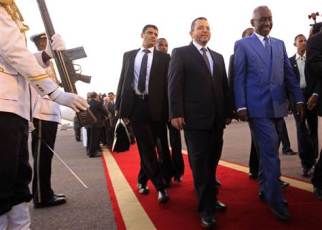Egyptian bank to fund investment in Sudan with 500 million dollars
September 20, 2012 (KHARTOUM) – An Egyptian commercial bank is going to inject 500 million US dollars into Sudanese markets to fund joint investment projects, the head of the bank said in the wake of growing political and economic rapprochement between the two neighboring countries.

Amir said that a capital of 50 million US dollars has already been paid to establish the NBE Khartoum branch, which he described as the vanguard of the “gigantic” investment activities that the bank intends to undertake in Sudan.
NBE branch was inaugurated by Sudan first vice-president, Ali Osman Mohammed Taha, and the visiting Prime Minister of Egypt, Hisham Qandil, who arrived in Khartoum on Wednesday following a two-day visit by Sudan president Omer Al-Bashir to Cairo, where he held talks with his Egyptian counterparts Mohammed Morsi and discussed ways of boosting bilateral relations with particular focus on the economic domain.
Qandil’s accompanying delegation, which features the ministers of foreign affairs, investment, industry and trade, planning and international cooperation, agriculture and transport along with 20 businessmen, held talks on Wednesday’s evening with Taha and Sudanese counterparts,
According to official media reports, the talks discussed various ways of activating joint agreements and implementing new projects in the fields of industry, trade, agriculture and investment.
NBE chairman said during the inauguration ceremony that the bank has earmarked 6 million US dollars to invest in agricultural projects in Sudan this year. He added that the amount would double to 12 million US dollars next year.
Amir also took the opportunity to encourage Egyptian businessmen to strongly enter the Sudanese markets, affirming his bank’s ability to meet all the funding requirements for the projects that Egyptian investors would undertake in Sudan.
Addressing the same event, Qandil revealed that Sudan and Egypt agreed to setup a tannery in Khartoum and a technical institution to train and build the capacity of employment cadres from both countries. Qandil also announced plans to inaugurate three roads connecting the two countries next year. He added that the project would reduce transportation cost and accelerate the already existing project of joint electricity supply.
The Egyptian official called on investors from both countries to meet the aspiration of Sudanese and Egyptian people especially in achieving food security.
Investment climate in Sudan was hit hard by the country’s loss of three-quarters of its oil production – and main source of state revenue – due to South Sudan secession in July last year. As a result, Sudan reserves of hard currency were sharply curtailed, leading to soaring inflation and a depreciating local currency.
Despite the risky investment climate, Sudan attracted a net 1.6 billion of direct investment in 2010, according to latest figures from the UN Conference on Trade and Development. Experts attribute this figure to interest in the country’s mineral wealth and potential for new oil discoveries.
(ST)
